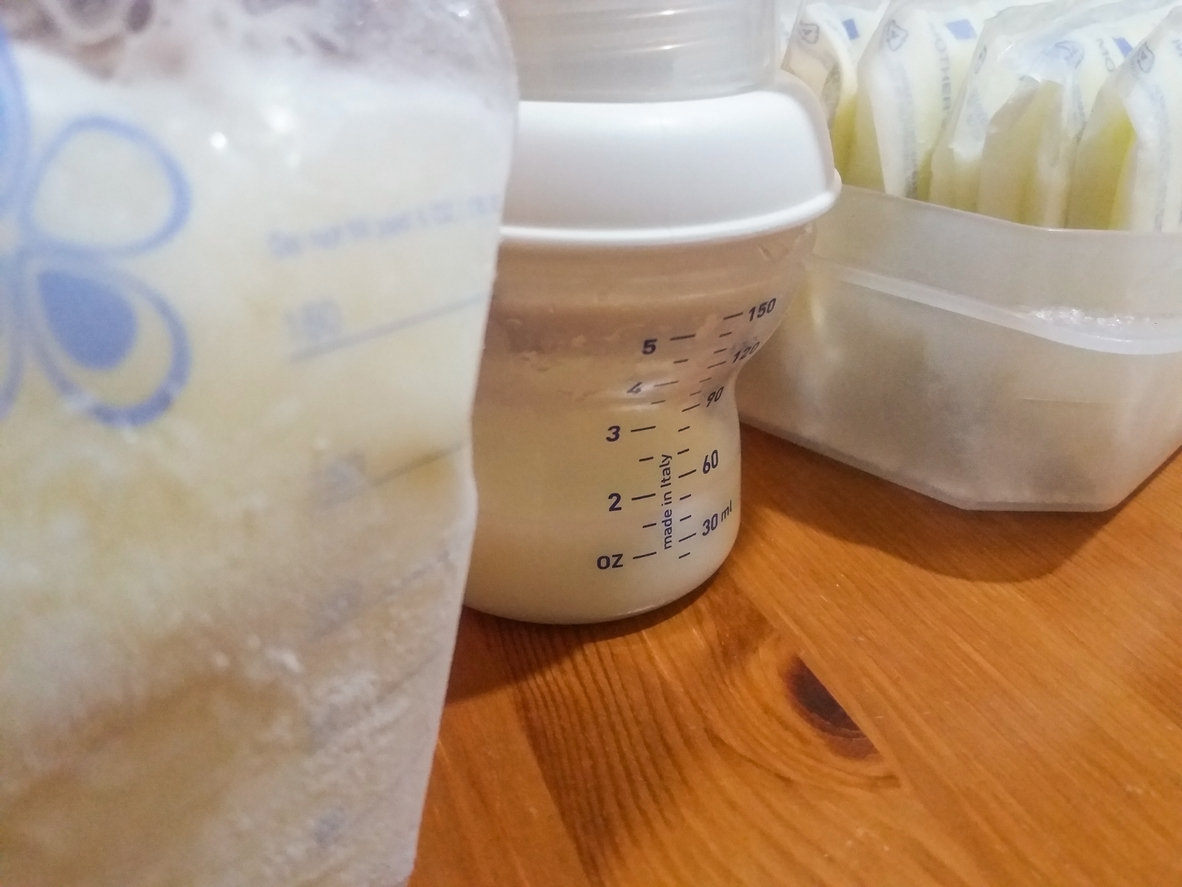
In recent years, the process of buying, selling, or even simply donating breast milk online has become an increasingly popular (and convenient) practice. Not just for moms having trouble producing breast milk themselves, but also for those with an over-supply who want to help other moms in need. It's created something of an unlikely online "village," and in most cases, the stories of breast milk swapping are feel-good ones. That is, except for one out of Vancouver, Canada, where a group of moms say they were scammed by a woman who received their breast milk for free, only to turn around re-sell it herself — for a sizable profit.
According to CBC, dozens of mothers say they donated their breast milk online to the stranger, who said she needed it for her own children.
It was all done through a Facebook group for moms in need of breast milk donations, where women regularly swap for free.
But recently, another mom signed on to inform others that she recently paid for breast milk from the woman who received it for free — the same woman who had claimed to be desperate to get it to her child.
And that's when people got angry.
Jodi Neidert, who donated 650 ounces of her own breast milk to the accused woman has one word for how she feels: Betrayed.
"I wanted to do something good and help someone who wasn't able to do [what] I could do," Neidert told CBC. "[But] to learn she is making money off of me and other good people, it's pretty sad."
Sad indeed. Twisted, even. But apparently, not illegal.
According to Canada's Royal Mounted Police, nothing can really be done about it because it isn't a chargeable offense.
"Once something is given or donated, you generally lose the right to tell someone what to do with it," Cpl. Michael McLaughlin of Coquitlam RCMP, told CBC.
All told, Neidert estimates the woman (who has not been identified publicly by the media or Neidert) made approximately $650 off the breast milk Niedert had donated. And she wasn't about to let her get away with it without saying something.
Neidert confronted the mother in a Facebook message -- and believe it or not, she came clean about the whole thing.
She also had an explanation as to why she'd done it.
"I donated my extra milk through human milk 4 Hyman babies when I had extra," the woman told her in the exchange, which was shared with CBC, "and then I started selling my milk after that. I felt like I still needed to provide for the baby I was selling to."
Hmm … I can see wanting to still help the mother who'd been receiving her breast milk, but why not hook her up with another donor, or introduce her to the Facebook group where she could request donations herself? Lying about the source of the breast milk — while continuing to collect some serious dough — is all sorts of shady.
Neidert certainly agrees.
"Then you should have given it for free," she shot back, before adding again how wrong it is to "make money off of other's hard work."
In the exchange, the woman apologizes multiple times, saying she is "very sorry" for her actions. But Neidert isn't the only mom who's annoyed.
According to CBC, Tanya Bemister also donated 100 ounces of milk to the unnamed woman in October, and was stunned when she learned the woman had turned it around for profit.
Especially since the Facebook group rules prohibit the buying and selling of breast milk for profit. In fact, the page description admonishes it, and even calls it "dangerous."
"Altruistic donation on the basis of informed choice and full disclosure is what we do," it reads.
Others within the group also say that adding to their annoyance is the fact that the woman "pestered them constantly" for milk and — get this — even told one mother to take medication to increase her supply.
"As a mom, I wanted to help out another mom," said Bemister. "I would never charge a mom."
In the US, buying breast milk online has become increasingly popular, but it has its fair share of shadiness too, says one report.
According to a report by Business Insider in 2018, online marketplaces allow new moms to place classified ads to sell their milk (for about $2 an ounce, on average). Because many milk banks charge more than that (about $4 an ounce) and often have limited supply, online marketplaces may feel more convenient and affordable for parents in need. But according to some, they may not always be the safest route.
In fact, in a 2015 study, researchers tested breast milk they'd ordered from an anonymous online marketplace and reported that 1 in every 10 samples they tested contained cow's milk. And not just a little of it, either — about 10 percent of the batch.
Business Insider also references a 2013 report that found 74 percent of milk from online marketplaces had harmful bacteria in it, likely from poor collection, storage, or contamination during the shipping process.
For now, the moms at the center of this story seem satisfied that the online scammer was called out for her shady practices.
They're also hoping this story will ward off any other potential scammers out there who are looking to make a quick buck themselves, in a way that's less than above-board.
"Makes me sick to my stomach that someone would profit off someone's good deed," Bemister told CBC. "I feel disgusting. Whether it's my milk or someone else, it was not to be sold, it was to be given to an infant in need."
In the end though, they say this won't deter them from donating their breast milk in the future. There will always be babies in need; and so long as they're able to produce extra milk, they feel it's their duty to pay it forward for other mamas.




